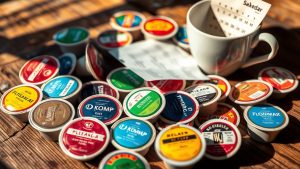
Bottled water's "best before" date typically indicates it's good for about two years, but it can remain safe for several years past that if you store it properly in a cool, dark place. The integrity of packaging is key; avoid heat and sunlight to prevent chemical leaching. Once opened, aim to consume it within one or two weeks for ideal freshness. Interested in learning how storage and packaging can affect its quality?
When it comes to bottled water, understanding its shelf life is vital for ensuring both quality and safety. Typically, you'll find a "best before" or "expiration" date printed on the bottle, which is usually set around two years from the bottling date. However, it's essential to acknowledge that these dates primarily serve as indicators of packaging integrity rather than actual water quality. The FDA doesn't mandate expiration dates for bottled water, but some states have enforced laws requiring them in the past. Thus, while an expiration date might catch your attention, it doesn't necessarily mean that the water will be unsafe to consume after that point.
Understanding bottled water's shelf life is crucial; expiration dates mainly reflect packaging integrity, not water quality.
Unopened bottled water can last indefinitely if you store it properly. In fact, it may remain safe and palatable for several years past its "best before" date. To maximize its longevity, keep the bottles in a cool, dark place away from heat and sunlight. BPA-free plastic is a good choice as it helps minimize the risk of chemical leaching into the water. Additionally, avoid placing the bottles near chemicals or cleaning supplies, as these can contaminate the water, even if the bottle remains sealed. Proper storage conditions can significantly extend the shelf life of bottled water, so always be mindful of where you keep it.
Over time, you might notice a "plastic" taste in the water due to the degradation of the packaging materials, but this doesn't necessarily mean the water is unsafe. The effects of packaging on shelf life can't be overlooked. While most bottled water is packaged in BPA-free plastic, it's vital to remember that prolonged exposure to heat can lead to chemical leaching. Regularly checking the condition of your water bottles is vital for ensuring safety. High-quality packaging can greatly extend the shelf life of bottled water, so investing in reputable brands can be beneficial.
Once opened, bottled water changes its dynamics entirely. It becomes susceptible to contamination from the environment, and you should aim to consume it within a week or two. Refrigerating opened bottles can help prolong their freshness, but be mindful of bacterial growth, particularly if you leave them at room temperature. Always wash your hands before handling the bottle to minimize bacteria transfer, and pay attention to any changes in taste, smell, or appearance, as these can indicate that the water is no longer safe to drink.
Storage conditions play a significant role in preserving the quality of bottled water. Ideally, store it at room temperature, avoiding direct sunlight and extreme temperatures, which can lead to plastic degradation. A dry area free from chemicals helps reduce contamination risks. It's also wise to avoid keeping bottled water in cars or hot environments to minimize any potential leaching.
In comparison to tap water, bottled water generally offers a safer option for long-term storage due to its sealed packaging. Tap water can lose its disinfectant properties over time, leading to a stale taste and increased contamination risk. Thus, if you handle both bottled and tap water with care, you can effectively maintain their freshness and safety.
Conclusion
In conclusion, while bottled water doesn't spoil in the traditional sense, its quality can degrade over time. Factors like storage conditions and plastic type play an essential role in this. You might wonder, what's lurking in that bottle after a year? Is it safe to drink? To guarantee you're sipping the freshest water, keep an eye on expiration dates and storage practices. After all, safeguarding your health often comes down to the small choices you make every day.



